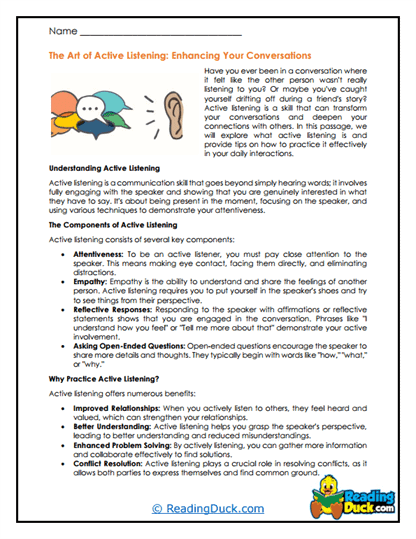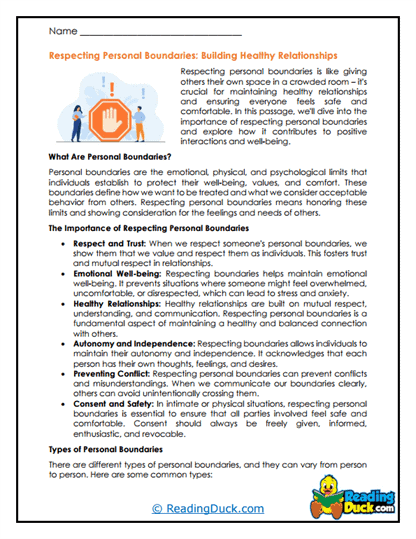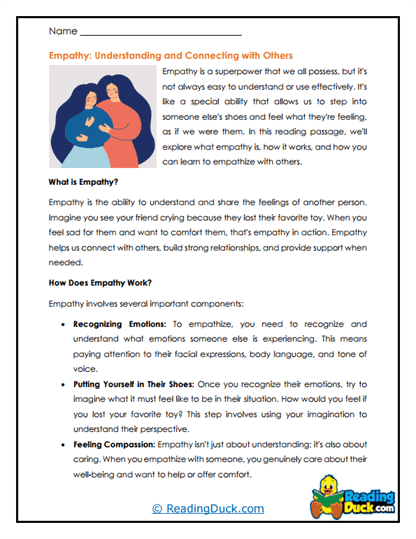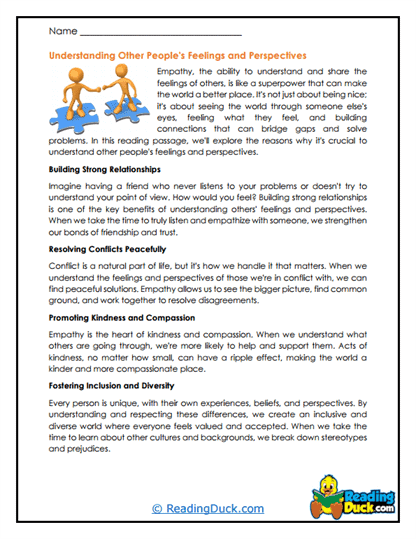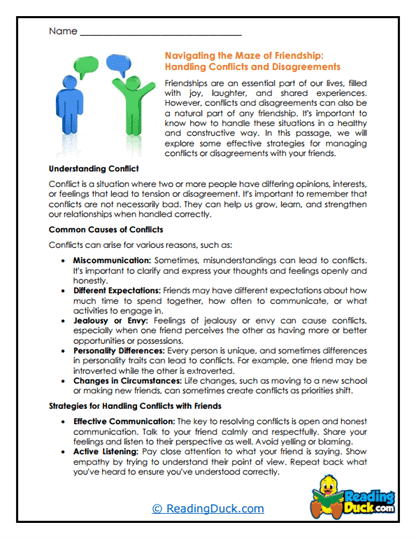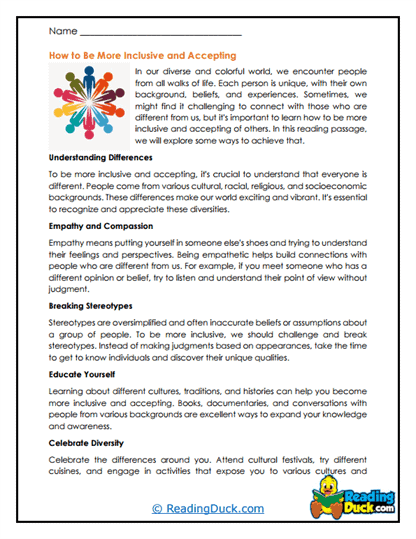Social Awareness Worksheets
About Our Social Awareness Worksheets
Our Social Awareness worksheets are designed to help students develop a deeper understanding of themselves and others, fostering empathy, compassion, and strong interpersonal skills. These worksheets guide students through various scenarios and concepts that teach them how to navigate social situations with confidence and respect. By exploring these topics, students can build a solid foundation in social and emotional learning, which is essential for success in both their academic and personal lives.
Each topic in this collection contains several worksheet sets that are thoughtfully crafted to engage students and encourage meaningful reflection:
- Multiple Choice Questions: These questions assess students' comprehension of the reading passages, ensuring they grasp the key concepts related to social awareness and its importance.
- Short Answer Questions: This format allows students to express their thoughts and insights in their own words, promoting deeper reflection on the material and helping them to internalize the lessons.
- Open-Ended Questions: These questions invite students to explore their personal experiences and feelings related to social awareness, encouraging critical thinking and self-expression.
These activities not only assess students' comprehension but also deepen their connection to the material. An answer key is provided for each worksheet, making it easy for educators to review and assess students' progress. All worksheets are available as PDF files, which can be easily viewed electronically, downloaded, and printed out.
Understanding Social Awareness: The Key to Building Positive Relationships
Social awareness is the ability to understand and respond to the needs, feelings, and perspectives of others. It is a crucial component of emotional intelligence that enables students to build healthy relationships, collaborate effectively, and contribute positively to their communities. When introducing this topic to students, it’s important to emphasize that social awareness is not just about recognizing social cues but also about acting on them in a way that is respectful and inclusive.
Key Aspects of Social Awareness:
- Understanding Social Awareness: Social awareness involves recognizing social cues and understanding the emotions and perspectives of others. This topic provides students with the foundational knowledge they need to navigate social situations effectively. It covers the basics of empathy, social cues, and the importance of being aware of the needs and feelings of others.
- How to Be a Team Player: Collaboration is a key aspect of social awareness. This topic teaches students how to work effectively in teams, emphasizing the importance of cooperation, communication, and mutual respect. Understanding how to be a team player helps students succeed in group settings, both in and out of the classroom.
- Social Norms: Social norms guide behavior in various social settings. This topic helps students understand what social norms are and why they matter. It also covers how to navigate different social environments while respecting the norms that govern them.
- Signs of Sadness or Upset: Recognizing when someone is feeling sad or upset is a vital social awareness skill. This topic teaches students how to identify signs of distress in others and how to offer support in a compassionate and appropriate manner.
- Handling Conflicts and Disagreements in Friendship: Conflicts are a natural part of relationships, but knowing how to handle them is essential for maintaining healthy friendships. This topic provides students with strategies for resolving conflicts peacefully and respectfully, ensuring that disagreements do not harm their relationships.
- Standing Up Against Meanness and Hurtfulness: Bullying and meanness can have a significant impact on individuals and communities. This topic encourages students to stand up against hurtful behavior and be allies to those who are targeted. It also teaches the importance of creating a supportive and inclusive environment.
- Why Being Kind to Others Matters: Kindness is a fundamental aspect of social awareness. This topic explores the benefits of being kind to others, both for the giver and the receiver. It encourages students to practice kindness in their daily lives, fostering a positive and supportive community.
- How to Be More Inclusive and Accepting: Inclusivity is about recognizing and respecting the differences among individuals. This topic teaches students how to be more inclusive and accepting of others, regardless of their background, abilities, or beliefs. Embracing diversity enriches the learning environment and helps build stronger communities.
- Respecting Personal Boundaries: Understanding and respecting personal boundaries is crucial for healthy relationships. This topic covers the importance of setting and respecting boundaries, helping students navigate social interactions with respect and consideration for others' comfort levels.
- Understanding Other People’s Feelings and Perspectives: Empathy is at the heart of social awareness. This topic teaches students how to put themselves in others' shoes, understand different perspectives, and respond with compassion. Developing empathy enhances students' ability to connect with others on a deeper level.
- The Art of Active Listening: Active listening is a key skill for effective communication and social awareness. This topic provides students with techniques for listening attentively and responding thoughtfully, ensuring that they fully understand and respect what others are saying.
- Empathy: Empathy involves recognizing and understanding the emotions of others. This topic delves into the concept of empathy, helping students develop the ability to connect with others on an emotional level. Empathy fosters stronger relationships and a more supportive community.
- Embracing Diversity: Diversity enriches our lives and communities. This topic encourages students to embrace diversity in all its forms, promoting a culture of respect, inclusion, and appreciation for the differences that make each individual unique.
These topics provide students with a comprehensive understanding of social awareness, helping them develop the skills necessary to build positive relationships, resolve conflicts, and contribute to a supportive and inclusive community. By exploring these aspects, students can cultivate a deeper sense of empathy, respect, and responsibility towards others.
Why Students Need to Learn About Social Awareness
Learning about social awareness is essential for students because it equips them with the skills they need to navigate the complex social dynamics they encounter in their daily lives. Social awareness helps students build and maintain positive relationships, which are crucial for their overall well-being and success. When students are socially aware, they are more likely to act with empathy, respect, and kindness, creating a more inclusive and supportive environment for themselves and their peers.
In addition to fostering healthy relationships, social awareness also plays a significant role in personal development. By understanding and respecting the feelings, perspectives, and needs of others, students can develop a stronger sense of community and social responsibility. This not only enhances their ability to work effectively in groups but also prepares them to be thoughtful, compassionate, and responsible members of society.
Integrating These Worksheets in a Curriculum
To effectively incorporate our Social Awareness worksheets into your curriculum, here are some tips for teachers and parents:
- Daily Reflection: Encourage students to reflect on their social interactions and how they can improve their social awareness. Daily reflection helps students internalize the lessons and apply them in real-life situations.
- Class Discussions: Use the worksheets as a starting point for class discussions on social awareness. Encourage students to share their thoughts and experiences, fostering an open and supportive environment for learning.
- Role-Playing Activities: Incorporate role-playing activities where students can practice social awareness skills, such as empathy, active listening, and conflict resolution. Role-playing helps students develop these skills in a safe and supportive setting.
- Group Projects: Assign group projects that require students to collaborate and practice social awareness skills. Group work helps students understand the importance of cooperation, communication, and respect for others' perspectives.
- Peer Feedback: Encourage students to give and receive feedback from their peers. Peer feedback helps students recognize areas where they can improve their social awareness and provides an opportunity for constructive growth.
- Incorporate Literature: Use literature and stories that highlight social awareness themes. Discuss the characters' actions and decisions, helping students connect the concepts of social awareness to real-life situations.
- Mindfulness Practices: Integrate mindfulness exercises that promote social awareness, such as mindful breathing, body scans, and guided meditations. Mindfulness helps students stay present and aware of their social interactions.
- Parental Involvement: Encourage parents to engage in social awareness activities with their children at home. This reinforces the lessons learned at school and helps create a supportive environment for developing social skills.
- Community Service Projects: Involve students in community service projects that require them to practice social awareness and empathy. Community service helps students apply what they've learned in a meaningful and impactful way.
- Regular Check-Ins: Conduct regular check-ins with students to discuss their progress in developing social awareness. Provide feedback and guidance to help them continue growing in this important area.
By integrating these strategies into your curriculum, you can help students develop a deeper understanding of social awareness, fostering their emotional intelligence and personal development. The Social Awareness worksheets are a valuable resource that can be used in various educational settings, making the study of social awareness accessible and engaging for all students. Through consistent practice and reflection, students will not only learn about the importance of social awareness but also develop the skills necessary to lead compassionate, connected, and fulfilling lives.
